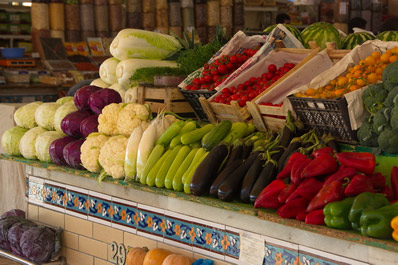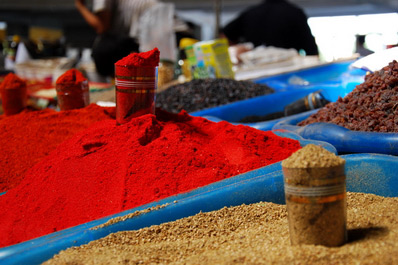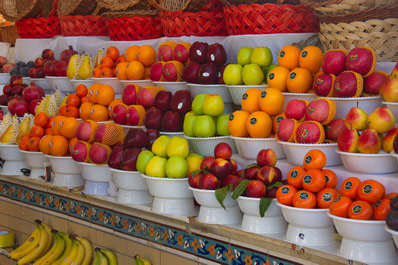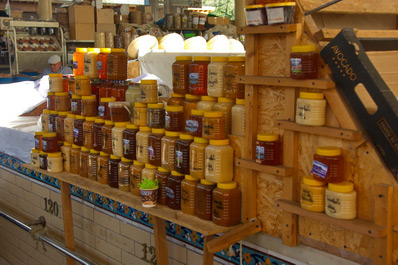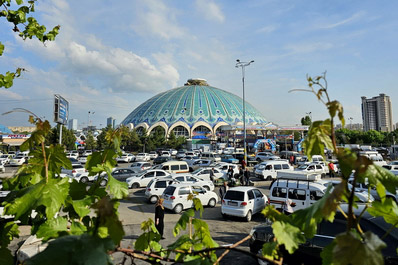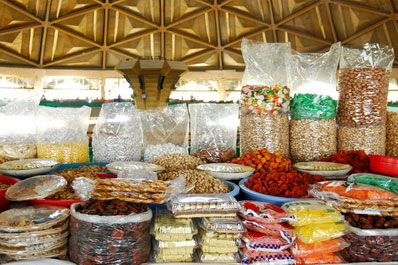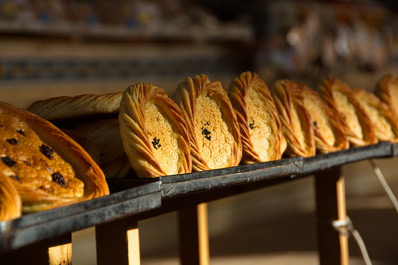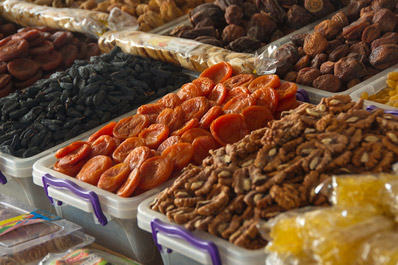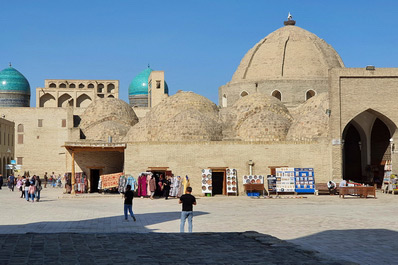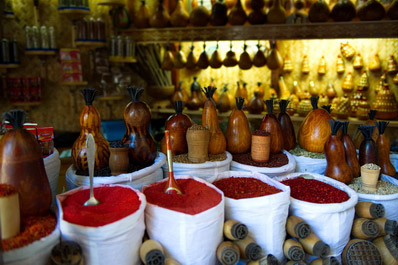Bazaars of Uzbekistan
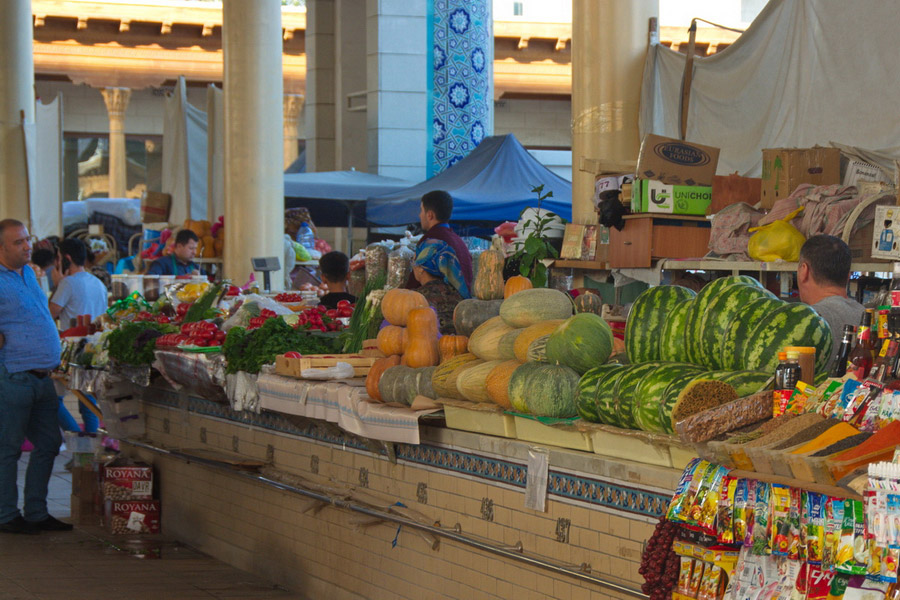
The bazaar is a quintessential element of Central Asian culture, transcending mere commerce to embody the rich philosophy of Oriental life. In Uzbekistan, bazaars are not just markets; they're vibrant hubs of community and tradition. For centuries, these bustling spaces have been where city and town dwellers gather to exchange news, where royal decrees were proclaimed, and where community festivals were celebrated.
Despite the proliferation of supermarkets and stores in major cities, Uzbek bazaars remain beloved. They're places of social interaction, haggling, and reconnecting with old friends.
The Essence of Uzbek Bazaars
Uzbek bazaars capture the true essence of the East. Here, among the crowds, you might encounter elders in turbans, sample aromatic fruits and vegetables, and engage with the friendly locals. The bazaar welcomes everyone, from the villager in rubber boots to the businessman in a designer suit, reflecting its role in daily life that extends beyond mere shopping to encompass social outings, traditions, and culture.
These markets are a feast for the senses, not just in terms of taste but also through their fragrant smells and visual beauty. The meticulous arrangement of goods, from neatly stacked fruits to pyramid-shaped vegetable displays, enhanced with the fresh mist on greens, adds to the allure.
Visiting a bazaar in Uzbekistan is an immersive experience. Prepare to spend a good part of the day wandering, tasting, and chatting. The culture here is rich; it’s customary to greet vendors and engage in light conversation, a testament to the country's renowned hospitality.
Diverse Offerings of Uzbek Bazaars
Sun-kissed Uzbekistan is celebrated for its delicious fruits - apricots, peaches, cherries, and melons, to name a few, are not only consumed locally but also exported. The bazaars also boast the freshest flatbreads, an array of dried fruits and nuts, and a plethora of aromatic spices that are a testament to Uzbekistan's agricultural richness.
Beyond edibles, these markets are treasure troves of national clothing, textiles, and souvenirs, offering a glimpse into the country's rich cultural tapestry.
Safety in Uzbek Bazaars
Uzbek bazaars are relatively safe, though it's wise to keep personal belongings secure. Photography enthusiasts should remember to ask permission before capturing images of sellers or fellow shoppers. While the markets are often loud, with vendors vocally attracting customers, this vibrancy is part of the charm, not a sign of discord.
Tasting the offerings is part of the experience, but for health reasons, it's advisable to eat only washed fruits if possible.
Gastronomic Alleys in Uzbek Bazaars
Many bazaars feature gastronomic alleys, affectionately known as gluttonous rows, where one can indulge in the flavors of traditional Uzbek cuisine. Tashkent's Chorsu Bazaar hosts the most renowned of these, a place where the simplicity of the setting belies the richness of the culinary delights on offer. A visit to Chorsu's gluttony row is a must for any food lover, offering an authentic taste of Uzbekistan's gastronomic heritage.
The enchanting aromas of shashliks, pilaf, naryn, and other delectable dishes waft through the air long before you reach the bustling gastronomic rows. The culinary experience at Chorsu Bazaar, known for its longstanding tradition of excellence, is second to none. This reputation is upheld by seasoned cooks, some of whom represent generations of culinary expertise, attracting loyal patrons year after year. Aziza-opa's samosas, a staple at Chorsu for over three decades, are a testament to this legacy. Moreover, the tradition of buying "tohora" - large basins brimming with celebratory dishes like samsa and pilaf for special occasions - underscores the bazaar's integral role in local festivities.
Dining at the bazaar is an invitation to immerse yourself in the local culture, sharing tables with strangers and embracing the opportunity to learn about Uzbek life. The atmosphere is defined by warmth and conviviality, making it easy to strike up conversations with those around you.
Navigating Payments at Uzbek Bazaars
Cash is king at Uzbek bazaars, where card payments are rare and the allure of fresh, fragrant produce makes it impossible to leave empty-handed. The act of sampling the finest fruits and nuts is often the first step toward filling your bags with these irresistible offerings. Hence, it's wise to come prepared with plenty of cash to indulge in the bazaar's bounty.
Uzbekistan's Must-Visit Bazaars
Chorsu Bazaar stands out as Tashkent's most vibrant market, boasting a rich history that dates back to the Middle Ages. Once a hub of social and commercial activity, Chorsu continues to offer a vast array of products, from fresh produce and spices to traditional clothing and handicrafts. Exploring Chorsu is an opportunity to savor locally grown fruits and discover aromatic spices, as well as to shop for traditional Uzbek attire and souvenirs.
Alay Bazaar offers a different vibe, focusing more on convenience than ambiance. Despite modern renovations, it remains a go-to spot for fresh foods, dried fruits, and exquisite gold jewelry. Its history possibly extends back 900 years, evolving from a livestock and meat market into the diverse bazaar it is today.
Yangiabad Bazaar, Tashkent's famed flea market, is a treasure trove for collectors and enthusiasts of vintage finds. From Soviet-era memorabilia to antiques and second-hand goods, Yangiabad is a testament to the city's eclectic spirit. It's also home to a vibrant pet market, catering to a wide range of animal lovers.
Siab Bazaar in Samarkand, situated near the historic Bibi-khanim Mosque, is renowned for its deep-rooted trading history. Visitors should not miss the chance to try the famous Samarkand halva, available in various flavors and individually wrapped for freshness. The bazaar is also the place to purchase traditional Samarkand bread and navat, a crystallized sugar delicacy.
The trade domes of Bukhara are a quartet of marketplaces that have been at the heart of Bukharan commerce since the 16th century. Each dome is distinct in its offerings. For nearly half a millennium, three of these domes have consistently traded in specific goods: Toki-Zargaron is famed for its gold and silver jewelry, Tim Abdullahan specializes in fabrics and carpets, and Telpak Furushon offers hats, knives, and musical instruments. The fourth dome, Toki Sarrofon, now a hub for souvenirs and shawls, was historically a pivotal center for money exchange in the Middle Ages. The trade domes of Bukhara are a quartet of marketplaces that have been at the heart of Bukharan commerce since the 16th century. Each dome is distinct in its offerings. For nearly half a millennium, three of these domes have consistently traded in specific goods: Toki-Zargaron is famed for its gold and silver jewelry, Tim Abdullahan specializes in fabrics and carpets, and Telpak Furushon offers hats, knives, and musical instruments. The fourth dome, Toki Sarrofon, now a hub for souvenirs and shawls, was historically a pivotal center for money exchange in the Middle Ages.
Adjacent to Chashma-Ayub lies Bukhara’s central food bazaar, a must-visit for two reasons: to soak in the authentic Bukhara ambiance and to purchase salted apricot pits.
While Khiva doesn’t have a traditional bazaar, its main streets within Ichan-Kala are lined with shops selling an array of items including scribble hats, woolen socks, fabrics, jewelry, and souvenirs, offering a modern shopping experience within the ancient city.
Mastering the Art of Bargaining in Uzbek Bazaars
Bargaining is an integral part of the shopping experience in Uzbek bazaars. If you’re new to haggling, embracing this practice is essential; not doing so might even slightly offend the vendors. While expecting a 50% discount might be unrealistic, aiming to not accept the initial asking price could yield pleasantly surprising results.
Bargaining transcends simple price negotiation, evolving into a lively exchange that enhances one’s negotiation and communication skills. The primary goal is to engage in this playful verbal dance rather than just securing a lower price.
A good starting point is to suggest paying 20% less than the offered price. If the vendor agrees too readily, feel empowered to push further or attempt a 30% reduction on similar items at another stall. Should the vendor balk at a 20% discount, incrementally increasing your offer may find you at an agreeable middle ground.
Bazaars are not just marketplaces; they are cultural landmarks scattered throughout major cities and smaller towns across Uzbekistan. To truly experience the rich tapestry of Uzbek culture and the splendor of the Orient, a visit to one of these bazaars is indispensable.


